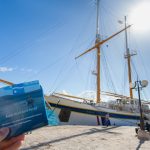Meet Plavi Jadran, the organization behind keeping Croatia’s coastline clean.
Recognizing the problem with keeping the Croatian coastline pure, especially with the problem of cigarette litter which remains “under the radar”, an informal group of activists gathered from 30 eco and indigenous organizations connected by “Plavi Forum”. From there, with the same goal dedicated to keeping the coastline of Croatia clean, “Plavi Jadran” (Blue Adriatic) was launched, reports Slobodna Dalmacija on March 2, 2017.
Anet Trope from Rijeka, the coordinator of “Plavi Jadran“, explains that this is a project that aims to encourage a clean coastline through activism and volunteering, modeling themselves after Krk, an island that has already achieved energy independence, waste control, and much more.
The concept advocated, which would apply to all of the Croatian coast, is simple and inexpensive, explains Vjeran Piršić of the Eko Kvarner association who is also involved in the project.
“‘Plavi Jadran’ is a systematic attempt to clean the coastline, mainly in the form of preventing the dispersion of waste in the environment, but also to collect all of the current waste on the coastline. If the project is supported by the utility companies – as is already done by the company “Ponikve” in Krk, or those whose job is to clean the coastline as their basis of business, such as hotels, camping – with a very small investment one could, using benevolence and environmental awareness so far unorganized by individuals, achieve very high results,” explains Piršić.
The dispersion of waste and garbage would be prevented by providing interested parties accessories to significantly reduce beach trash such as cigarettes and discarded chewing gum. The accessories, for example, would consist of plastic ashtray-like cones (eco-bins) that can stick in the sand or pebbles and can be used many times. The bins would have the printed advertising logo of the city, hotels, or restaurants participating in and helping to finance the action.
“In addition, beaches are filling with waste, and the islands in the southern Adriatic are getting garbage from Albania, forcing sailors themselves to clean the beaches or bays often in order to find a decent place to dock. It would be good to share plastic bags in a recognizable blue color to collect waste from the beaches, for which there could be a reward. For instance, a bag of garbage collected could get you a free drink at a local bar as a small token of gratitude for what you have done.”
The operational plan to ”spring clean” the beaches begins the first weekend in March and lasts until the last weekend of May – and it is an event that is repeated each year. Already this March, Plavi Jadran has gone to a dozen locations in the Adriatic to find quality utility companies or interested hotel owners – and any interested parties who would like to co-operate and help finance the purchase of the beach trash ”accessories”. The project is estimated to begin in Pag, Nin, Bol, Jelsa, Lastovo, Orebić, Gradac, Neretva river delta, Mljet and of course Krk, the island that is the root of this project.
Gathered activists will establish a coordinating body (not in the form of a legal person) that will search for the cheapest method to solve the pollution problems along the coastline while finding utility companies or hotels to finance the project with the idea that the money collected is spent locally.
This model of “associated labor” and participation in cleaning the coastline has great potential, says Piršić, and in the coming years the network will expand to new locations in an effort to fully cover the eastern Adriatic coast.









